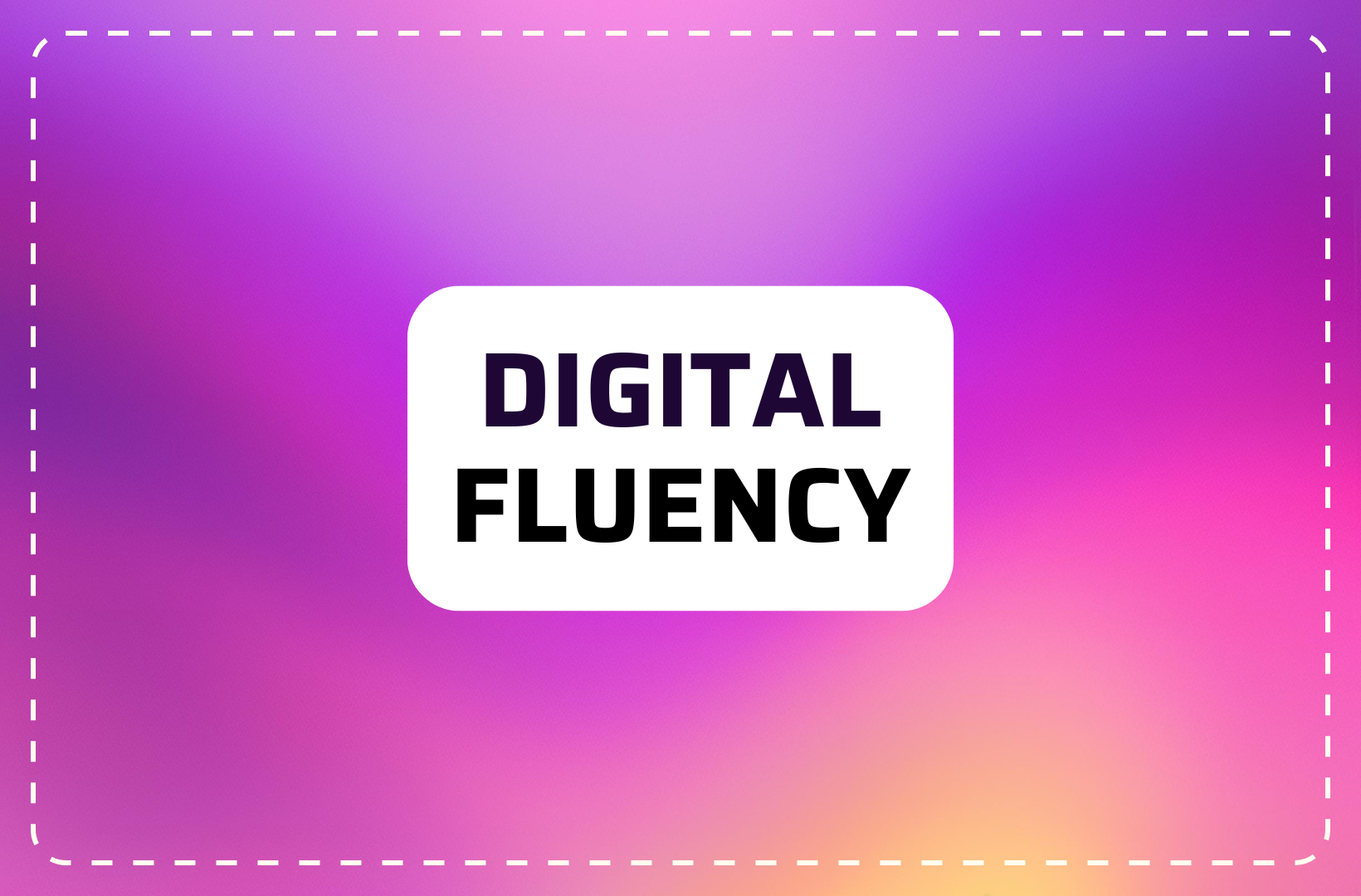Whether it's data analytics, project management software, or remote communication tools, digital platforms are now part of almost every job. It's no longer enough to know how to send emails or use spreadsheets. Businesses need people who can think, work, and solve problems in digital environments.
This article will explain what digital fluency means, why it matters more than ever, and how professionals at every level can develop this must-have skill.
This article will explain what digital fluency means, why it matters more than ever, and how professionals at every level can develop this must-have skill.

1. More Than Just Knowing the Tools
Digital fluency is different from basic computer literacy. It's not just about knowing how to use a specific app. It's about being able to learn new tools quickly, use them with confidence, and understand how they fit into bigger business processes.
For example, someone with digital fluency can spot which software will help a team meet its goals.
Digital fluency also means being flexible. New tools are always being introduced. What matters most is your ability to adapt and stay current.
For example, someone with digital fluency can spot which software will help a team meet its goals.
Digital fluency also means being flexible. New tools are always being introduced. What matters most is your ability to adapt and stay current.
2. What Hiring Managers Are Really Looking For
Job descriptions today often list "digital skills" or "tech proficiency" as required. But employers aren't just looking for someone who can use one tool. They want people who can work smoothly in digital environments and learn on the fly.
This means knowing how to use CRM systems, manage shared calendars, or update information in cloud-based apps. Even soft skills like problem-solving or time management are now tied to digital tasks. Can you manage your day using online tools? Can you share your work in a clear and trackable way?
Some professionals choose formal education to boost these skills. The online MBA Marketing program from Youngstown State University is one example. The program is part of the Williamson College of Business Administration, which holds AACSB accreditation, a mark of quality earned by fewer than 6% of business schools worldwide.
This program helps students build real-world marketing strategies using digital tools, understand consumer behavior in online spaces, and apply leadership skills across business settings.
This means knowing how to use CRM systems, manage shared calendars, or update information in cloud-based apps. Even soft skills like problem-solving or time management are now tied to digital tasks. Can you manage your day using online tools? Can you share your work in a clear and trackable way?
Some professionals choose formal education to boost these skills. The online MBA Marketing program from Youngstown State University is one example. The program is part of the Williamson College of Business Administration, which holds AACSB accreditation, a mark of quality earned by fewer than 6% of business schools worldwide.
This program helps students build real-world marketing strategies using digital tools, understand consumer behavior in online spaces, and apply leadership skills across business settings.
3. Keeping Up with Rapid Tech Changes
Technology changes fast. What's useful today might be replaced in a year. Digital fluency is about more than learning one system. It's about being able to adjust when tools change or when new platforms are introduced.
Professionals who are digitally fluent don't panic when their company switches software. They know how to explore features, test things out, and ask the right questions. They also stay informed about trends in their industry, so they're ready when updates happen.
It helps to build habits around learning. Even spending a few hours each month on webinars, tutorials, or product updates can make a difference. When you treat learning as part of your routine, change becomes easier to manage.
Professionals who are digitally fluent don't panic when their company switches software. They know how to explore features, test things out, and ask the right questions. They also stay informed about trends in their industry, so they're ready when updates happen.
It helps to build habits around learning. Even spending a few hours each month on webinars, tutorials, or product updates can make a difference. When you treat learning as part of your routine, change becomes easier to manage.
4. Working Well with Cross-Functional Teams
Most companies run on teamwork. But that teamwork often happens between people in different roles: marketing, sales, operations, and more. These teams rely on shared digital tools to work together.
Digital fluency helps people stay connected and aligned. If someone in sales updates a record in the CRM, the marketing team can use that data to adjust campaigns. If someone on the finance team updates a budget file in the cloud, operations can use that to plan the next steps.
When everyone on a team understands how to use digital systems, things move faster. There's less back and forth. There are fewer mistakes. Everyone is on the same page.
Digital fluency helps people stay connected and aligned. If someone in sales updates a record in the CRM, the marketing team can use that data to adjust campaigns. If someone on the finance team updates a budget file in the cloud, operations can use that to plan the next steps.
When everyone on a team understands how to use digital systems, things move faster. There's less back and forth. There are fewer mistakes. Everyone is on the same page.
5. Staying Safe in Digital Workspaces
It's not just about using tech. It's also about using it safely. Digital fluency includes basic awareness of online risks. That means recognizing suspicious emails, knowing how to create strong passwords, and being careful with how you share files.
Companies often provide cybersecurity training, but it's up to individuals to take that seriously. One mistake (like clicking a bad link) can cause major problems.
Being digitally fluent means knowing how to protect both personal and company information. It also means knowing when to report an issue or ask for help. Security is a shared responsibility, and fluency makes it easier to manage that together.
Companies often provide cybersecurity training, but it's up to individuals to take that seriously. One mistake (like clicking a bad link) can cause major problems.
Being digitally fluent means knowing how to protect both personal and company information. It also means knowing when to report an issue or ask for help. Security is a shared responsibility, and fluency makes it easier to manage that together.
6. Practical Ways to Build Digital Fluency Now
You don't need a tech background to get better at digital skills. Start with the tools you already use. Learn more about what they can do. Try features you haven't used yet. Look for free tutorials online or ask coworkers how they manage their tasks.
Many platforms also offer free learning resources. Google, Microsoft, and LinkedIn all provide training that's easy to follow. You can also join forums or user groups for shared tools in your industry.
If you want a more structured option, consider a course or certification. Some professionals explore online degree programs to build a broader skill set.
The key is to stay curious and keep practicing. The workplace is changing, and digital fluency is no longer optional. It helps you work faster, communicate better, and solve problems with confidence. Whether you're just starting your career or aiming for a leadership role, digital fluency will help you stay competitive.
You don't have to be an expert in every platform. But you do need to be open to learning, willing to explore new tools, and ready to grow. The more comfortable you get with digital systems, the more value you'll bring to your team and the more opportunities you'll create for yourself.
Many platforms also offer free learning resources. Google, Microsoft, and LinkedIn all provide training that's easy to follow. You can also join forums or user groups for shared tools in your industry.
If you want a more structured option, consider a course or certification. Some professionals explore online degree programs to build a broader skill set.
The key is to stay curious and keep practicing. The workplace is changing, and digital fluency is no longer optional. It helps you work faster, communicate better, and solve problems with confidence. Whether you're just starting your career or aiming for a leadership role, digital fluency will help you stay competitive.
You don't have to be an expert in every platform. But you do need to be open to learning, willing to explore new tools, and ready to grow. The more comfortable you get with digital systems, the more value you'll bring to your team and the more opportunities you'll create for yourself.
FAQ
What is digital fluency in a professional context?
Digital fluency goes beyond basic computer literacy, it’s about mastering the ability to use, adapt to, and learn digital tools quickly. It’s understanding how technology integrates into workflows, problem-solving, and decision-making processes, making you a valuable asset in any business.
Why is digital fluency a must-have skill in modern workplaces?
Modern businesses rely heavily on technology, and digital fluency ensures that employees can adapt to fast-evolving tools, collaborate across teams effectively, and stay ahead of industry trends. Being digitally fluent boosts productivity, reduces errors, and positions professionals as forward-thinking innovators.
How is digital fluency different from digital literacy?
Digital literacy is about knowing how to use common tools like email or spreadsheets, while digital fluency encompasses adaptability, problem-solving, and seamless integration of digital tools into larger business processes. Fluency enables you to evolve with technology, not just cope with it.
Why do hiring managers prioritize digital fluency?
Recruiters value candidates who can navigate digital tools fluidly and adapt to new ones without needing extensive training. This skill enhances efficiency, improves collaboration in tech-oriented workflows, and marks an employee as someone who embraces innovation.
How can professionals start building digital fluency today?
Professionals can begin by maximizing underused features of current tools, participating in free online training programs, or exploring certifications. Developing habits like regular learning and staying updated on tech trends also fosters adaptability and competency.
What benefits does digital fluency offer for cross-functional teamwork?
Digital fluency allows for seamless collaboration across departments (e.g., marketing and finance) by ensuring everyone can use shared tools effectively. This reduces delays, improves alignment, and creates a synchronized and efficient workflow.
How does digital fluency tie into cybersecurity awareness?
Digital fluency includes understanding basic cybersecurity measures, such as creating strong passwords, spotting phishing attempts, and sharing files responsibly. Safe digital practices reduce risks for both individuals and organizations, fostering a secure work environment.
Can digital fluency improve leadership capabilities?
Absolutely. Leaders with digital fluency can drive change by implementing effective technologies, managing team dynamics across various digital platforms, and nurturing a culture of tech-adept innovation, positioning their teams for sustained growth.
Why does digital fluency matter for entrepreneurs?
Entrepreneurs often work across multiple platforms and need to streamline operations efficiently. Digital fluency allows them to scale swiftly, automate tasks, and implement tools that give them an edge in competitive markets.
How can small business owners benefit from digital fluency?
Small business owners can leverage digital fluency to enhance customer experiences, manage operations through cost-effective tech solutions, and make data-driven business decisions, all of which contribute to long-term success and sustainability.


